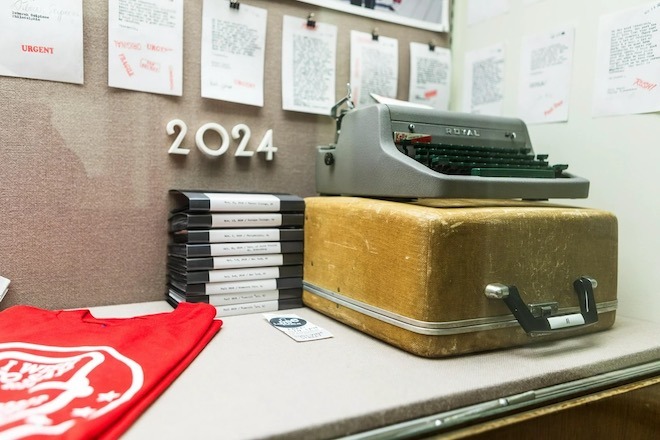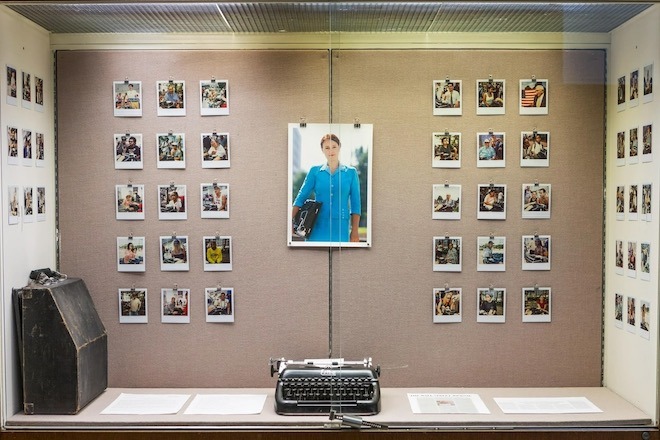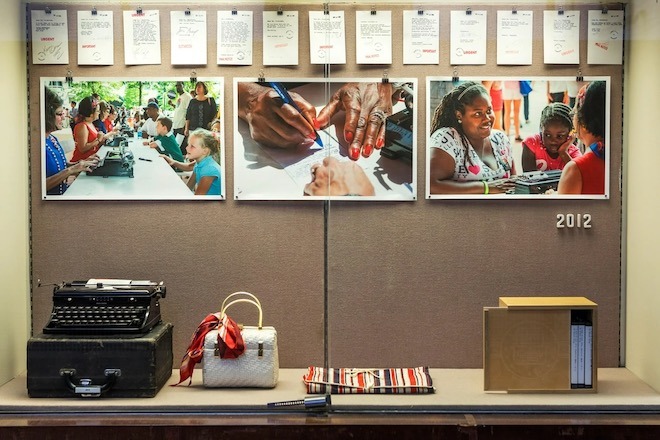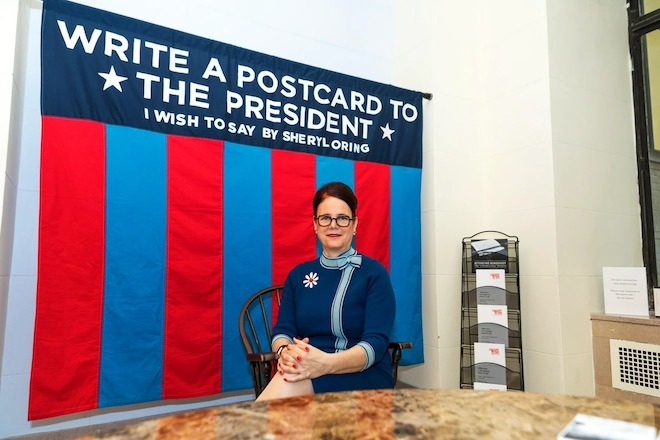Since 2004, I’ve traveled across America with a vintage typewriter, inviting people to dictate their personal messages to the President of the United States. I’ve set up my mobile office on South Broad Street in Philadelphia, at a flea market in Albuquerque, New Mexico, in Bryant Park in New York City, and the Venice Street Boardwalk in Los Angeles — collecting more than 5,000 messages that capture our collective hopes, fears and dreams. What began as an art project, however, has revealed unexpected truths about human connection in a world where screens dominate our daily lives.

When I started this project in San Francisco on February 8, 2004 — just four days after Facebook got its start as a social network at Harvard — the iPhone didn’t exist and most of us still experienced life without constantly checking a device. The radical shift in how technology now shapes our every interaction wasn’t visible on the horizon. I had no idea I was creating what would become a counterpoint to our accelerating digital culture. I simply knew that something powerful happened when people encountered a typewriter in public space — a moment of pause, of curiosity, of unexpected engagement.
As we approach the Global Day of Unplugging — when millions worldwide disconnect from technology for 24 hours — these exchanges feel more relevant than ever. In a world where nearly 80 percent of Americans check their phones within 10 minutes of waking up and the average person taps, swipes and clicks their device over 200 times daily, my typewriter has become more than a curiosity — it’s a portal to intentional connection, a symbol of resistance to our constantly divided attention.
My two decades of typing strangers’ thoughts have convinced me that meaningful human connection requires both physical presence and freedom from digital distraction.
When someone sits across from me as I listen intently and type their words, something remarkable happens. The mechanical nature of the process — the resistance of the keys, the indelible impression of letters striking paper — creates a natural space for reflection absent from our digital communications. There’s no delete key for hasty thoughts, no emoji to substitute for fully formed feelings. Words aren’t just transmitted; they’re absorbed, acknowledged and honored.
I’m not a therapist or psychologist, but the “radical listening” I do at my typewriter is a form of witnessing that people respond to profoundly. As they watch me capture their every word, letter by letter, they know they’re being taken seriously — perhaps in a way they rarely experience in our distracted digital culture. I’ve seen eyes light up with the realization that someone is truly listening, truly valuing what they have to say.

This deep connection isn’t exclusive to typewriters. Something similar happens when I incorporate Polaroid photography into my work. Like typewriters, these instant cameras require intention — you can’t simply capture dozens of images and discard the imperfect ones. The single, precious exposure forces careful composition. The subject must consider how they wish to be portrayed. The resulting image captures not just a face, but a moment of authentic presence — precisely what the Global Day of Unplugging encourages us to reclaim.
Across America, young people are increasingly seeking analog experiences that foster genuine human contact. Reading parties draw crowds to hot spots. Chess, mahjong and backgammon clubs are experiencing unprecedented growth among Gen Z participants. Groups like 222 organize IRL meetups for groups of strangers. Their manifesto boldly declares: “We won’t tolerate an existence where we spend the majority of our time in a virtual world, robbed of our attention, meaning & core life experiences.” According to one NIH study, people who engage in screen-free activities for just two hours daily report 40 percent higher satisfaction with their social relationships — a statistic that surprises no one who has experienced the quality of connection that emerges when we set our devices aside.
Real understanding rarely comes through rapid exchanges, but through the patient work of listening deeply, considering carefully, and responding thoughtfully — one letter, one word, one human connection at a time.
The implications extend far beyond personal well-being. My two decades of typing strangers’ thoughts have convinced me that meaningful human connection requires both physical presence and freedom from digital distraction. When we communicate through screens, we often sacrifice nuance for immediacy, and understanding for impact.
For this year’s Global Day of Unplugging, people across the country will participate in nature hikes, book clubs, device-free dinners and more. For my part, I’ll be hosting a typewriting workshop at the Free Library of Philadelphia as part of my “Secretary to the People” traveling library exhibit. If you’re in the Philadelphia area, I invite you to join us. But wherever you are, I encourage you to experiment with analog tools — not as quaint novelties, but as powerful instruments for reclaiming attention and fostering connection. Dust off that typewriter, or pick up a Polaroid camera, a notebook or a sketchbook. Note what changes in your thinking, your conversations, and your sense of presence.

Our challenge isn’t to reject digital tools entirely but to establish a more intentional relationship with them. Sometimes the most powerful stance we can take in our hyperconnected world is simply to unplug — to create space for thoughts that develop at their own pace, connections that unfold naturally, and words that carry the weight of careful consideration.
In the end, what my typewriter has taught me about communication might be the most valuable lesson for our fragmented attention spans: real understanding rarely comes through rapid exchanges, but through the patient work of listening deeply, considering carefully, and responding thoughtfully — one letter, one word, one human connection at a time.

Sheryl Oring is an artist whose project “I Wish to Say” has collected more than 5,000 messages to U.S. Presidents from across the country. Her current traveling library exhibit, “Secretary to the People,” is on display at The Free Library of Philadelphia, where she will host a typewriting workshop on Saturday, March 8, for the Global Day of Unplugging.
The Citizen welcomes guest commentary from community members who represent that it is their own work and their own opinion based on true facts that they know firsthand.
![]() MORE ON CONNECTING PEOPLE FROM THE CITIZEN
MORE ON CONNECTING PEOPLE FROM THE CITIZEN



